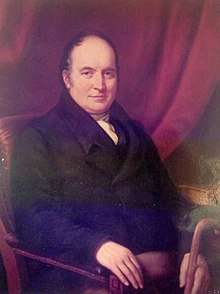Henry Overton Wills I

Henry Overton Wills I (2 March 1761 – 1826) was a British merchant who in 1786 opened a tobacco shop in Bristol that evolved into W.D. & H.O. Wills, which eventually became one of the largest tobacco companies in late 19th-century Britain.
Career
Henry Overton Wills was born on 2 March 1761 in Salisbury, England to a watchmaker named Edmund Wills. He came as a young man by coach from Salisbury to Bristol where he formed a partnership with Samuel Watkins to open a tobacco shop on 73 Castle Street. They named their operation Wills, Watkins & Co. When Watkins retired in 1789 from the business, it became Wills & Co, with Wills as sole proprietor. He soon found new partners, and the company merged in 1791 with the firm of Peter Lilly, which also had a mill to grind tobacco into snuff. Lilly and Wills named the new company Lilly, Wills & Co, and they consolidated operations to Lilly's old shop at 111-12 Redcliff Street. They then simplified the company name in 1793 to just Lilly and Wills. When Lilly retired in 1803, he was replaced by Samuel Ditchett, and the firm became Wills and Ditchett.[1][2][3]
Wills' partnership with Lilly proved to be profitable, and the company in 1804 was valued at £15,435 (2017 value: $1.67 million U.S.). They changed the name of their firm again in 1819 to Wills, Ditchett & Co., Wills by this time having brought his sons William Day Wills and Henry Overton Wills II into the operation, first as apprentices and later as junior partners. He continued to be involved in the firm up until his death on 1 Dec 1826 in Bristol, at which point his sons took over their father's interests in the business. They subsequently became senior partners of the company in 1830 when their father's former partner Samuel Ditchett retired, and they renamed the company to W.D. & H.O. Wills, which grew to become one of the largest tobacco importers in Victorian England.[1][2][3]
Personal life
Wills married Anne Day, the daughter of a linen draper, in Bristol on 24 June 1790, which was at a time when he was the sole proprietor in his tobacco venture. They raised their family in the strict Congregationalist faith, and the Wills and their descendants actively supported the church in Bristol for more than a century. Their sons William Day Wills and Henry Overton Wills II, who acquired a fair degree of wealth running the business they inherited from their father, were particularly generous in their support for non-conformist religious causes. The Wills family were also quite active in local politics, both by supporting the Liberal Party and by standing themselves for election to city offices as Liberal candidates. Wills is said to have been a non-smoker, despite the fact that he might be regarded by some as one of the founders of the British tobacco industry.[4][2][5][6]
References
- 1 2 "A Timeline of Events in the History of W.D & H.O. Wills". W.D & H.O. Wills: The Bristol based tobacco company founded in 1786 (website). Retrieved 3 Dec 2017. This same timeline is also found in "Pipes Magazine (website)". Retrieved 3 December 2017.
- 1 2 3 B.W.E Alford (2013). W.D. & H.O. Wills and the Development of the UK tobacco Industry: 1786-1965. Routledge. pp. 3–54.
- 1 2 S.J. Watson (1991). Furnished with Ability: Lifves and Times of the Wills Families. Norwich, England: Michael Russell Publishing Ltd. p. 9-34.
- ↑ Sir Bernard Burke (1898). "Wills: Baronet of Blagdon and Baronet of Manor Heath". Burke's Genealogical and Heraldic History of Peerage, Baronetage and Knightage. London: Burke's Peerage Limited. p. 1538.
- ↑ George H. Graham. "Henry Overton Wills I JP (1761-1826)". Genealogy: Graham-Milburn family data (website). Retrieved 1 Dec 2017.
- ↑ "Henry Overton Wills I (1761-1826)". W.D & H.O. Wills: The Bristol based tobacco company founded in 1786 (website). Retrieved 3 Dec 2017.